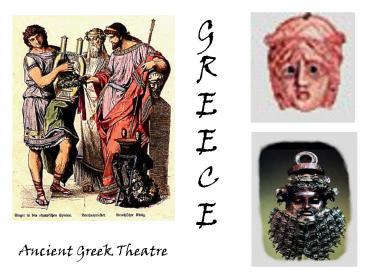GREECE - PowerPoint PPT Presentation
1 / 6
Title:
GREECE
Description:
... use of masks in ancient Greek theater developed from the ancient Dionysiac cult. They were originally used for worshipping the various gods of the Greek people ... – PowerPoint PPT presentation
Number of Views:46
Avg rating:3.0/5.0
Title: GREECE
1
GREECE
Ancient Greek Theatre
2
There were few actors on the stage during a play.
The characters were always played by men,
varying from one to three in number plus chorus
members. They had to use multiple masks in order
to play more roles.
The use of masks in ancient Greek theater
developed from the ancient Dionysiac cult. They
were originally used for worshipping the various
gods of the Greek people but grew into what we
know consider the first intelligible theatre
culture.
Some scholars think the mask gave the character
some sort of universality, creating an average
figure, so that the audience would judge him on
his actions and not his appearance. The mask
created a link from the actor to the audience.
3
The Greek masks were instrumental in showing the
audience who each character represented. Most
plays had what is know as stock characters
heroes, villains, damsels in distress, the comic
relief, any mythical characters like gods,
goddesses, demons, or speaking animals.
Some scholars also think that the masks were
constructed in such a way as to create a
megaphone for the actors voice. The mouth
opening was very large and shaped like a cone
creating a sound magnifier, useful in those large
theatres.
4
Sophocles- the great Tragedian
- Born in 495 B.C. about a mile northwest of
Athens, Sophocles was to become one of the great
playwrights of the golden age. The son of a
wealthy merchant, he would enjoy all the comforts
of a thriving Greek empire. By the time he was
28, after completing his schooling, he began
competing in the City Dionysia--the festival held
every year at the Theatre of Dionysus in which
new plays were presented. He competed with more
than 120 plays in following years and won
nineteen first prizes, never failing to take at
least second.
One of the great innovators of the theatre, he
was the first to add a third actor to his plays.
He also abolished the trilogic form. Aeschylus,
for example, had used three tragedies to tell a
single story. Sophocles chose to make each
tragedy a complete entity in itself--as a result,
he had to pack all of his action into the shorter
form, and this clearly offered greater dramatic
possibilities. Many authorities also credit him
with the invention of scene-painting and
periaktoi or painted prisms.
5
Sophocles
- Of Sophocles' more than 120 plays, only seven
have survived in their entirety. Of these,
Oedipus the King is generally considered his
greatest work. This tragedy of fate explores the
human reason and interventions of chance as
Oedipus unwittingly kills his father and marries
his mother in an attempt to avoid the very
prophecy he ultimately fulfills. A masterful work
of plot and suspense, Oedipus the King is called
the "perfectly structured" play. And although
Oedipus cannot escape his fate, he finally finds
peace in the sequel, Oedipus at Colonus, after
enduring the worst the fates had to offer. - The masterpiece we will be reading, Antigone, is
possibly the first of the surviving plays to have
been written. It is the story of a passionate
young woman who refuses to submit to the
authority of a ruler when it forbids the proper
burial for her brother Polyneices. Illustrating
the rival claims of the state and the individual
conscience, Antigone is an excellent example for
the modern social dramatist. - Shortly after the production of Oedipus at
Colonus in 405, Sophocles died.
6
Your job for today
Design a replica of an ancient Greek mask to
describe the personality of a character we have
read.
- Requirements
- The mask must fit your face.
- You must be able to see.
- You may make it out of anything except for a
pre-made mask. - It must display a character in The Birds
- It must be unique it must be imaginative.
- What can you use to make your mask?































